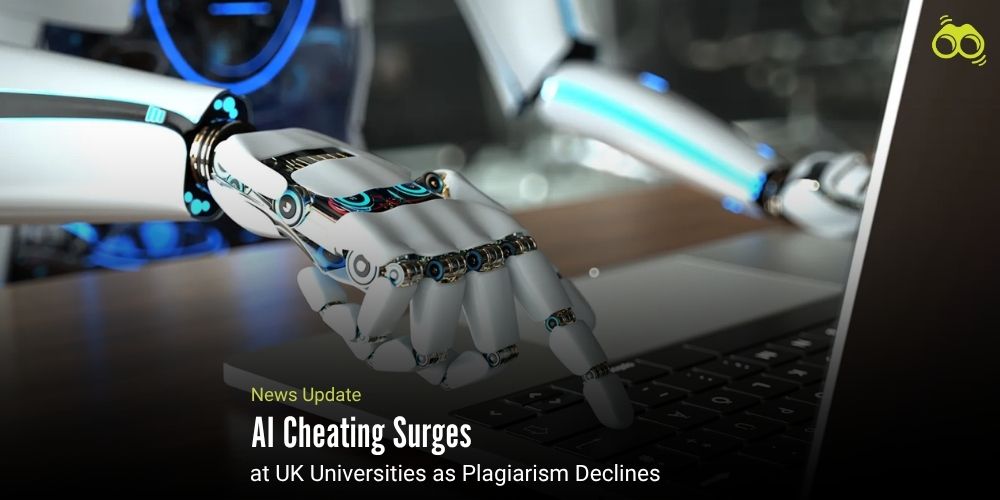Beyond Plagiarism: AI Reshapes the Landscape of Academic Dishonesty
Academic Misconduct in the Digital Age: AI’s Growing Role in University Cheating
Artificial intelligence is fundamentally reshaping education, introducing innovative solutions that enhance learning, streamline administrative tasks, and improve accessibility. AI-powered tools enable students to personalise their learning experiences, automate research processes, and bridge educational gaps through adaptive technologies. However, despite these advancements, AI is also posing serious challenges to academic integrity, particularly in higher education.
Recent reports indicate a sharp rise in AI-assisted cheating, with 7,000 students caught using AI tools such as ChatGPT for academic misconduct in British universities during the 2023–24 academic year, a significant increase compared to previous years. This equates to 5.1 students per 1,000, and early projections suggest that the numbers may continue to rise in 2024–25. Furthermore, AI-generated plagiarism is becoming increasingly difficult to detect, leading 68% of educators to rely on AI detection tools to combat academic dishonesty.
A Guardian investigation has highlighted a notable shift in academic misconduct trends across UK universities. While traditional plagiarism is declining, the misuse of AI tools is on the rise, with students increasingly opting for AI-generated content instead of simple copy-paste techniques. In 2019–20, plagiarism accounted for nearly two-thirds of all academic misconduct cases. However, by 2023–24, that figure had dropped to 15.2 cases per 1,000 students, and preliminary data for the current academic year suggests it may decline further to 8.5 per 1,000.
Despite the surge in AI-related cheating, many universities remain unprepared. Of the 155 institutions contacted by The Guardian, 131 responded, yet few provided complete data, and many lacked systems to track AI misuse separately. Experts believe that most AI cheating goes undetected, with a University of Reading experiment revealing that AI-generated essays bypassed detection tools 94% of the time. The investigation also found that students are becoming more strategic in their use of AI. Rather than simply copy-pasting answers, some use AI to organise responses, clarify complex concepts, or summarise readings, particularly those with learning difficulties such as dyslexia. In this context, AI is viewed not just as a cheating tool but also as a study aid.
This shift has prompted universities to rethink assessment methods. While exams are considered one possible solution, experts argue that not all essential skills can be tested in person. They advocate for a stronger focus on teaching abilities AI cannot easily replicate, such as critical thinking, communication, and collaboration, and urge educators to help students understand the purpose behind their assignments.
The UK government has stated that it is investing in skills development and aims to use AI to support, rather than compromise, educational integrity. However, the report concludes that the sector is still struggling to balance AI’s benefits with the risks it poses to fair assessment. As AI continues to evolve, universities must adapt their policies and assessment strategies to safeguard academic integrity while embracing technological advancements.
Editor’s Note:
Artificial intelligence is rapidly reshaping higher education—enhancing learning opportunities while simultaneously challenging long-standing academic norms. Tools like ChatGPT offer students quick access to information and assistance with complex tasks, but they have also made cheating easier and harder to detect. A recent Guardian investigation revealed that nearly 7,000 UK university students were caught using AI to cheat in 2023–24, a sharp increase from previous years. At the same time, traditional plagiarism cases have declined, suggesting a shift in how academic misconduct occurs, with students now using AI to paraphrase, summarise, and structure responses rather than simply copy-pasting content. What makes this shift more troubling is the sector’s lack of preparedness. Many universities still lack proper mechanisms to monitor AI misuse, and standard plagiarism detectors are failing to identify AI-generated text. One University of Reading experiment showed that 94% of AI-written essays went undetected. Of the 155 UK universities approached by The Guardian, only 131 responded, and most could not offer complete data on AI-related cheating. This gap highlights how the academic system is struggling to keep pace with technological change, leaving educational integrity vulnerable.
Skoobuzz underscores that universities should adapt assessment methods beyond traditional exams to focus on AI-resistant skills like critical thinking and creativity. While AI can support learners, its pedagogical integration requires careful balancing with academic honesty to preserve education's value.














0 Comments (Please Login To Continue)